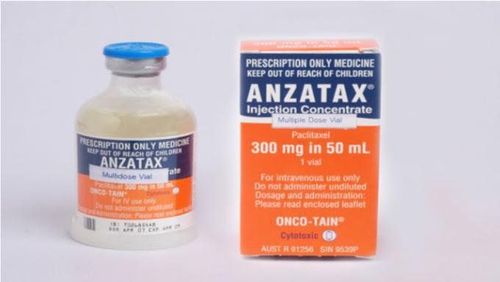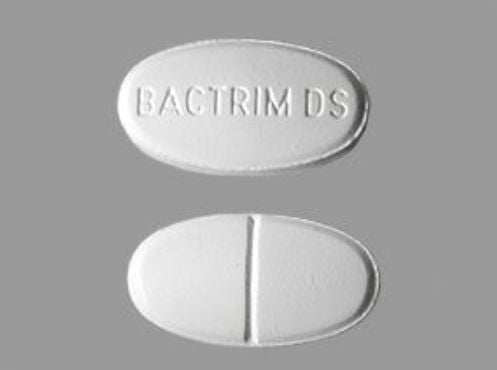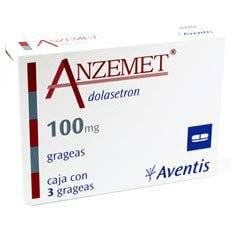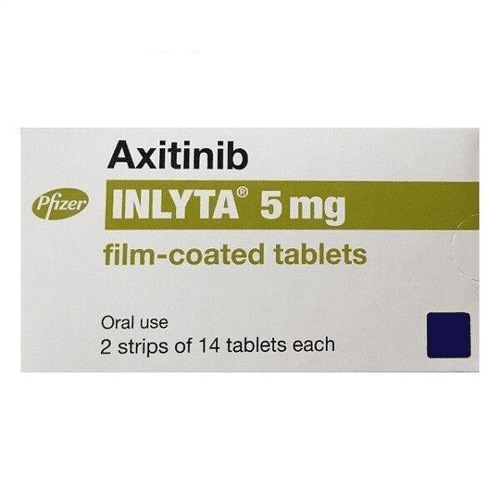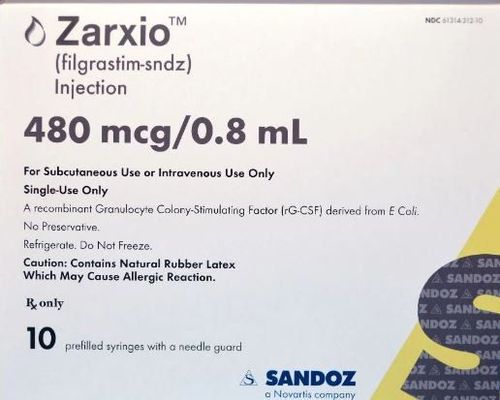This is an automatically translated article.
Erlotinib is a cytotoxic chemotherapy drug. The drug has the main active ingredient Erlotinib hydrochloride, which is a kinase inhibitor, an anticancer drug. This drug is prepared in the form of tablets with many different strengths such as 25mg, 100mg and 150mg. So what does Erlotinib treat?1. What is Erlotinib?
Erlotinib is a medicine that works by reducing the proliferation of cancer cells. The drug is very effective in the treatment of lung cancer. Erlotinib is also used with other medicines to treat pancreatic cancer.
According to a study on advanced stage non-small cell lung cancer patients treated with erlotinib at the Lung Department, Cho Ray Hospital from December 2007 to September 2011 as a second or third step treatment and step one only when the patient cannot receive conventional therapy (chemotherapy) shows that: High response rates, prolonged progression-free survival in both step two/third and step one patient groups . In addition to patients with anatomic adenocarcinoma, squamous cell patients still respond to treatment. The most common side effects are diarrhea and acne, and rarely serious side effects.
Erlotinib has proven to be highly effective and low toxicity has helped treat many patients with advanced non-small cell lung cancer with a better outcome.
2. Indications and contraindications for drug use
Erlotinib is indicated for use in the following subjects:
Patients with advanced stage 1 non-small cell lung cancer with EGFR mutations. Patients on second-line therapy for locally advanced or metastatic non-small cell lung cancer that have been resistant to at least one chemotherapy regimen. Patients with locally advanced, inoperable or metastatic pancreatic cancer (used in combination with gemcitabine in first-line therapy). Those who need to be careful when taking Erlotinib:
Patients who are allergic to Erlotinib or any of the ingredients in the product. Patients with liver failure; patients who have or have had lung disease, have lung disease due to previous chemotherapy or radiation therapy. Patients with a history of gastric ulcer, patients receiving corticosteroids, non-steroidal anti-inflammatory drugs, chemotherapy with taxanes. The patient is dehydrated. Pregnant women and lactating women use caution.
3. How to use Erlotinib?
Erlotinib is a prescription drug, the information below is not a substitute for a doctor's advice. Always consult your doctor or pharmacist before deciding to take a medication.
The usual dose for adults to treat non-small cell lung cancer is 150 mg/day, taken 1 hour before meals or 2 hours after meals. Patients should not drink with grapefruit juice.
The recommended dose for the treatment of pancreatic cancer is 100mg/day, taken 1 hour before or 2 hours after a meal.
Therapy is continued until disease progression or unacceptable toxicity is observed. In case the drug dose must be reduced, it should be reduced in steps of 50mg.
Regularly check and monitor liver function, kidney function and electrolytes.
Erlotinib is not recommended for use in patients under 18 years of age because the safety and effectiveness of the drug has not been established in this population.
For patients with liver failure, kidney failure: It is necessary to use the drug under the guidance of a specialist and be careful when using the drug.
Erlotinib should be taken at the same time every day. Dosage is based on your medical condition and your body's response to therapy.
Patients absolutely do not arbitrarily increase or decrease the dose of medicine without a doctor's prescription. That may increase the risk of side effects.
4. What are the possible side effects when taking Erlotinib?
Erlotinib causes many unwanted effects on many different organs and parts of the body:
Effects on the central nervous system: making patients tired, fever, depression, headache. Skin Effects: Rash, itching, dry skin, hyperpigmentation, acne. Effects on the digestive system: Causes diarrhea, anorexia, nausea, vomiting, stomatitis, abdominal pain, paralytic ileus, pancreatitis, gastrointestinal perforations. Effects on eyes: Causes conjunctivitis, conjunctivitis - cornea with dry mouth. Effects on the respiratory system: Causes dyspnea, pneumonia, pulmonary infiltrates, pulmonary fibrosis, signs of interstitial lung damage. Effects on the liver: increase ALT, increase blood bilirubin. Affects the cardiovascular system: Causes deep vein thrombosis, cerebrovascular accident, myocardial infarction, myocardial ischemia, arrhythmia, syncope, edema. Affects the kidneys: Can cause kidney failure, nephritis, proteinuria for users of the drug. In addition, Erlotinib can cause hemolytic anemia, hemolytic anemia with thrombocytopenia due to microvascular disease, increased risk of infection. So what should be done when encountering these undesirable effects?
In case of acute manifestations or increased pulmonary signs such as cough, fever, shortness of breath, the drug must be stopped until a definitive diagnosis is made. If the patient is diagnosed with interstitial lung disease, the drug must be discontinued and appropriate therapy instituted.
If dehydration occurs, especially in patients at risk of renal failure, the drug should be discontinued and rehydration active. In case of worsening of liver function tests, the drug should be discontinued or the dose reduced.
If gastrointestinal perforation must be stopped completely. Reduce the dose or temporarily discontinue the drug if diarrhea is severe, Toperamide is ineffective, or dehydration occurs. Erlotinib drugs adversely affect the skin, temporarily stop or stop using the drug.
In case the drug affects the eyes or shows severe toxicity such as eye pain, erlotinib must be temporarily stopped or completely stopped depending on the extent of the effect. Myelosuppressive treatment: Use filgrastim for adults at an initial dose of 5 micrograms/kg/day intravenously or subcutaneously, or Sargramostim at 250 micrograms/m2/day by slow intravenous infusion over 4 hours. Recombinant human erythropoietin can be used to prevent or treat anemia caused by anticancer drugs.
5. Some notes when using Erlotinib
Those who need to be careful when taking drugs need to pay more attention to their own treatment process.
Erlotinib is absorbed through the skin, so women who are pregnant or may become pregnant should not handle or break this tablet.
For pregnant women: The drug is toxic to the fetus, so when planning to become pregnant, it should not be used. Pregnant women who take the drug can have a miscarriage.
It is not known whether Erlotinib can be excreted in breast milk. Therefore, while taking the drug should stop breastfeeding.
Erlotinib should be taken on an empty stomach, should be taken at least 1 hour before meals or 2 hours after food because food can increase the bioavailability of erlotinib.
In case of suspected drug overdose: Activated charcoal can be used (do not use ipeca), supportive treatment, blood count monitoring, liver function, regulation of water - electrolyte balance, chest X-ray to damage detection.
If you miss a dose, take it as soon as you remember. However, if it is almost time for your next dose, stop taking the old dose and take the next dose as scheduled.
Patients need to inform the specialist about the drugs they are using for advice and guidance on drug use to avoid drug interactions. Thereby increasing the effectiveness of treatment and reducing the risk of side effects.
Erlotinib is a drug that has been studied to be effective and safe in lung cancer patients. In addition, it is also effective for patients with pancreatic cancer. However, Erlotinib is a prescription drug, patients should strictly follow the instructions of the specialist, should not self-medicate. The drug also interacts with many other drugs such as warfarin, omeprazole, ketoconazole, ... and food, fruits such as grapefruit, ... Therefore, to avoid affecting the effect of the drug, patients need to take the drug far from meals. eating and when there are abnormal signs, it is necessary to inform medical staff for advice and guidance.
Please dial HOTLINE for more information or register for an appointment HERE. Download MyVinmec app to make appointments faster and to manage your bookings easily.




